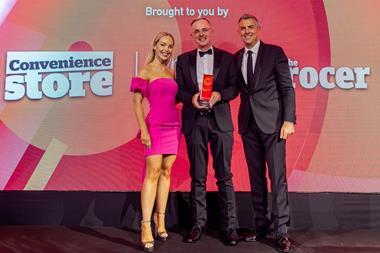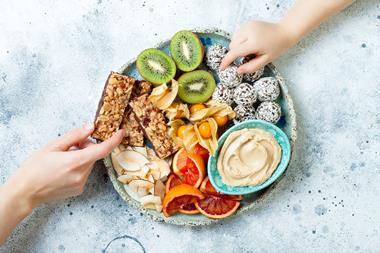Our C-Store Champions have a number of techniques they use to differentiate themselves from their nearby competitors
Susie Hawkins, director of Simon Smith Group, which owns seven Budgens and Spar stores in Gloucestershire
Susie focuses on niche products that aren’t available in the supermarkets
Donna Morgan, Brownlies of Biggar, South Lanarkshire
Donna ensures her staff go above and beyond to provide everything her community may need
Emma Jenkins, Milverton Stores, Taunton, Somerset
Emma strives to provide a bespoke range which perfectly meets her customers’ requirements
Lionel Cashin, The News Shop, Market Weighton, Yorkshire
Lionel says independents need to work together to ensure they are not priced out in the cashless future
What is your main competition?
Susie: Obviously with seven stores they are all slightly different but they all compete with one to three supermarkets as well as other convenience stores.
Emma: We are in a rural village which is about three miles from any other shop but our main competition is the supermarket delivery services.
Donna: We have a Co-op, Sainsbury’s Local, Spar, two local butchers, another corner shop, a newsagent, a baker and a fruit and veg shop. They are all within half a mile, serving a population of 2,500.
Lionel: We are a small town of about 4,000 people and we have a large Tesco, a small Asda, a Co-op, a refurbished Post Office and a specialist card shop.
How has your competition changed since first setting up shop?
Susie: We’ve only had one big supermarket open but certainly a lot more c-stores are popping up, especially as supermarkets are moving into the convenience market. We’ve also had more discounters opening. Independents are upping their game as well. So generally, competition has grown from a number of angles.
Emma: The online delivery services have appeared in the last few years and these have appeared from a range of supermarkets. It’s a very convenient option for residents in our area as we are quite far from the supermarkets so the delivery service has almost become their more convenient service.
Donna: Since we first took over the shop, the Co-op has got a lot bigger and the Sainsbury’s Local has come in.
Lionel: We had the large Tesco open about eight years ago in an area of land which was not designated for retail. The planning application implied it would be a small shop – unnamed - and it turned out to be a 20,000-plus sq ft Tesco. Asda used to be an Esso. The Post Office now has a retail offering but they don’t do soft drinks or tobacco, just cards and newspapers. The specialist card shop has been open about a year.
In what ways does this competition affect your business?
Susie: The competition, especially from the discounters, tends to offer a low price point which is difficult for us to compete with but thankfully I don’t think shoppers expect us to offer the same prices. I think having the competition encourages us to really emphasise what makes us special. A really important aspect of what we do is our great customer service.
Emma: Everyone has upped their game in terms of their fresh offer as this is more important to shoppers now. We have always worked hard to make our fresh offering strong as 30% of our sales come from this category but we have continued to improve it. People may get a shop delivered to them to last the week but they are not going to be able to have fresh food every day with that service. We ensure that if they come into our shop, we have all their fresh food requirements. We get a daily delivery from Nisa which is crucial for this.
Donna: The strengths of the multiples are their purchasing power, the deals they can offer and their advertising abilities. We asked the Post Office how much it would be to put a flyer up and we were told it would cost £500 a month, so we couldn’t afford that sort of money. But their weaknesses are that they don’t know the area or their shoppers as well as we do. On the contrary, we can react quickly to customer requests. We’ve built our shop on the belief we are here for the community. We make sure to stock the products that the multiples don’t, such as more local products. We have the personal touch.
Lionel: Each competitor is very different but I can highlight the areas we are stronger in and how we have worked to ensure we are an important part of the community. We open earlier – at 5.30am. We deliver newspapers and no one else does. We know our customers personally. If people are ill, we will deliver things to them. I think competition keeps us at the top of our game and I personally get a huge buzz out of being a part of the community and keeping customers happy.
How do you keep track of the competition?
Susie: The best thing to do is to regularly go to the stores yourself and see what they have. I tend to go with my store managers.
Emma: I go and look around each one every couple of months. Obviously I only shop in my own store because it has everything I need.
Donna: I send my staff in. I don’t go in myself. It’s such a small community, if I were seen they would wonder why. But I get my staff to report back on what they are doing.
Lionel: I go to each of them myself at least once a month.
How do you see your competition changing in the future?
Susie: Perhaps not so much the number of shops increasing but the variety of ways people can get their shopping is certainly increasing. Internet shopping never really worried me before as I thought it was mostly used for big shops but now Amazon is rolling out a food and drink delivery service, and UberEATS and Deliveroo are looking at extending their services, it does concern me that these are providing very convenient options for shopping. I think competition is going to start coming from more angles as these new companies appear.
Emma: I think the whole delivery aspect will only get more competitive but I think it will reach a point where those that use it, use it, and those that don’t, don’t. I don’t think it will keep growing forever. The discounters will always be there but I think people are starting to realise the difference between ‘cheap’ and ‘value’. They are starting to realise that cheap means it won’t always be in stock and it won’t necessarily be good quality. I think a good quality, interesting and locally-sourced offering will always be required.
Donna: That’s the concern. The town is growing so will another multiple come in? One of the reasons we added the Post Office service to our store was to ensure we have a safeguard to make sure customers keep coming into the store.
Lionel: The local Co-op will be turning into a McColl’s newsagent so that could bring more direct competition but I won’t know until it’s here. Waitrose has just opened its first cashless store. The banks’ drive to eliminate cash is not good news for small retailers. It costs us too much to be profitable. Independent retailers have to fight against card charges that destroy margins.
What’s your advice to any retailer who is soon to have new competition?
Susie: Don’t just sit and wait to see what they do - look to up your game before it arrives. It’s important to generate loyalty with your shoppers and make a name for yourself within the community so people have you front of mind. Make sure you are on social media as that is a really great business tool. Build up your followers on Facebook by increasing your communication on there. Carry out competitions and offer prizes via those pages. Ask suppliers for their help with supplying prizes. You only need small items to give away so suppliers are usually very good with this, I find.
Emma: Work on your unique selling point. Understand what you do best and do it as well as you can. Don’t be tempted to stray from your roots and try to compete directly with their offering. Concentrate on what you do best and do it better than ever before. Also, make sure you have everything needed to meet people’s shopping needs for their evening. That’s where a convenience store can really shine and provide where others can’t.
Donna: Just look at everything you are doing and see if you can do anything better. Really engage as much as possible with customers. This is an area where you can really make an impression on the customer.
Lionel: Understand the competition, make sure you are an important part of the community and build relationships with customers. Someone once told me the only constant in life is change. That’s what makes British retail so exciting. Shops that offer something different, alongside a very high quality service, will prosper. If you can’t thrive off the competition then you’re in the wrong business.
How do you differentiate yourself from your rivals?
Susie: We complement our ranges with local and niche products that aren’t available in supermarkets. These don’t have to be more expensive but they do tend to look more premium and interesting. We also make sure our stores are clean, bright, well-stocked and our staff are friendly. We want to ensure customers have a good experience when shopping with us. We also work hard to build loyalty by communicating with the community through social media and getting involved in local events. We have a good relationship with the local school and host competitions and give out prizes to the children. Our red bear mascot comes to a lot of our events and the school and he is well recognised in the area.
Emma: We know that our shoppers want to see locally-produced, high quality fresh produce. We even offer fresh produce that you can’t even find in the supermarkets.
Donna: We are really part of the community. We do school visits, the primary school children come here to post their letters to Santa. The atmosphere in our shop is so much better than in the chain stores and people know we care about them. My husband is running 1,000 miles for MacMillan and he’s raised £2,000. We also do the MacMillan coffee mornings and we pick up prescriptions for customers - we try to be the hub of the community.
Lionel: It’s all about the customer service - understanding the customer and bringing in specialist products. We ensure we respond to customer requests in a way that the larger companies can’t. We have fresh locally-sourced milk and locally-produced sandwiches.
What action have you taken to respond to your competitors’ strengths and weaknesses?
Susie: Like I say, I don’t think we can compete on price all the time. Instead, we have to concentrate on the areas they are weaker in so we can exploit these areas instead. For example, supermarkets haven’t been that great at beers, wines & spirits so that’s an area we try to excel in. We also excel in our convenience. We have parking, we are smaller and easier to get around quickly, we are helpful, open long hours and we try to ensure it’s easy to find everything. This sort of thing can make a huge difference.
Emma: We make sure to stock a wide range of beautiful fruit and veg at a competitive price. All our produce is very fresh and delicious. It is grown within walking distance of the store. Even if people don’t buy it, they like to see that we are unique and supporting the local producers as that is something they have come to expect fom us.
Donna: When the Co-op and Sainsbury’s came in within a year of one another, we completely ripped the shop out and started again. It was a scary time for us as it was a lot of money to invest. We changed the way we worked and changed our opening hours so we open at 6am instead of 8am. We do food-to-go and hot coffee.
Lionel: With the Post Office doing cards alongside the new specialist card shop, that has caused direct competition for us as cards are a big part of our offering. But by developing our range we have increased our sales in the last 12 months so that has been positive. Competition is good in a way as it keeps you on top of your game.
The C-Store Champions are a group of experienced retailers who understand the role of the local store in their community. They are tuned into the demands and desires of their customers and believe in continual development of their businesses. Each month the Champions share their expertise
















![C-Store_Champions_logo-CHOSEN[1] 2023](https://d2dyh47stel7w4.cloudfront.net/Pictures/380x253/6/5/7/301657_cstore_champions_logochosen12023_817064.jpg)




No comments yet